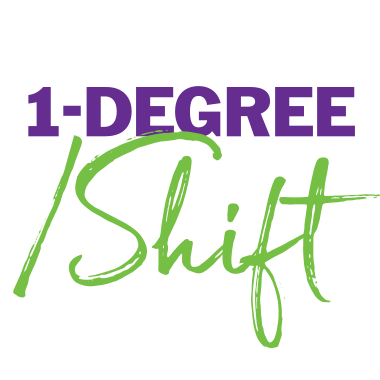When people understand and align with a purpose, their work feels more meaningful. This leads to higher engagement, motivation, and satisfaction. – Simon Sinek
Our relationship with work is changing. Today’s workforce craves meaning, purpose and fulfillment at work, crucial elements for both employee satisfaction and the success of any organization.
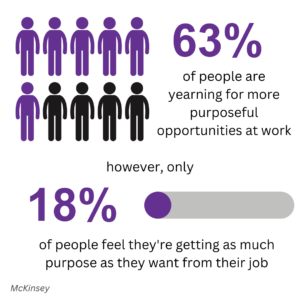 For organizations to grow, its people must grow—and purpose becomes one of the key tools to foster deeper connection at – and with work. People want more meaning in their work lives–and the data supports this: 63% are yearning for more purposeful opportunities at work, however only 18% of people feel they’re getting as much purpose as they want from their job.
For organizations to grow, its people must grow—and purpose becomes one of the key tools to foster deeper connection at – and with work. People want more meaning in their work lives–and the data supports this: 63% are yearning for more purposeful opportunities at work, however only 18% of people feel they’re getting as much purpose as they want from their job.
The choice is clear: to foster a transformative work culture that transcends mere transactions or risk losing high-performing talent to workplaces that promise a greater sense of purpose.
To understand purpose at work, we need to recognize that there are two levels to it: the individual level—understanding what drives and motivates each employee, and the organizational level—a clear company vision. The power lies in connecting the two together, creating in a culture where business growth is inextricably linked to the personal growth of its people. Fulfilling the organization’s purpose is directly enabled by helping people to fulfil their personal purpose.
Employees aren’t just seeking jobs anymore; they are seeking work that aligns with their deepest values. It’s time to shift the focus from working for a living to working for a purpose.
Leading With Purpose
Purpose is often misconstrued as a buzzword or a soft aspect of business strategy. However, the potential of purpose is actually a transformative force that can redefine an organization’s trajectory.
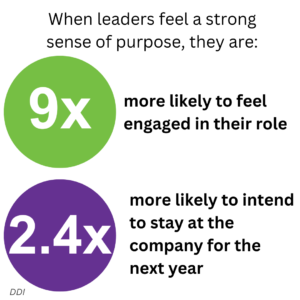
In contrast to the traditional transactional leadership that prioritizes short-term gains and direct exchanges, transformational leadership infused with purpose seeks to inspire and motivate, creating a vision that resonates deeply with employees. When leaders feel a strong sense of purpose, they are:
- 9X more likely to feel engaged in their role
- 2.4X more likely to intend to stay at the company for the next year
The trouble is that even at the C-Suite level, less than two-thirds say they find their job full of meaning and purpose – and the purpose deficit gets even stronger in first- and second-line leaders.
Getting clear about individual purpose is a powerful driver for engagement at work. Imagine being able to experience more fulfillment at work – work becomes more meaningful and our impact more intentional. Employees that say that their purpose is fulfilled by their work, are up to 5x more satisfied, energized, engaged and connected.
By understanding what truly motivates employees—their sense of purpose—leaders can unlock unprecedented levels of engagement, productivity, and loyalty. Purpose is the very essence that ensures relationships within the business are meaningful and that work evolves from mere exchange of time for money to contributing to something greater.
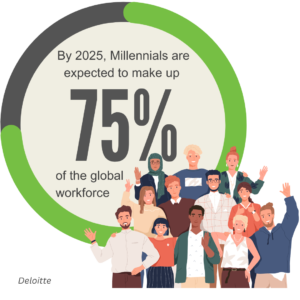 Essential for the Next Generation
Essential for the Next Generation
Purpose holds significant value to younger workers, a crucial point for organizations considering that by 2025, Millennials are expected to make up 75% of the global workforce.
The traditional career goals such as achieving an impressive salary or title just doesn’t resonate with Millennials. What they want is more purpose at work—being able to contribute and make a real impact. According to a survey of more than 1,500 Canadian office workers, 47% of Millennial respondents say they would give up a pay raise for more meaningful work. Often the meaningful work is already there – what has been missed is the recognition of the connection to their personal purpose and only 27% of company leaders are actually guiding their teams to make that personal-professional purpose connection.
Considering the hefty chunk of our lives we pour into our jobs, it’s pretty clear why we all want that time to count for something more. In fact, around 70% of people say define their purpose through work, and this is especially true for Millennials, who tend to blend their work with their life’s mission . Knowing this, it’s time for companies to step up and help their team members figure out and embrace what really drives them at work. The onus is on businesses to not only help their employees pin down their own purpose but to also weave it into the fabric of the company’s broader vision.
Leaders who demonstrate an alignment between their personal purpose and the corporate purpose can inspire authenticity throughout the organization. This authenticity can create a more transparent, trustworthy, and positive workplace culture. – Simon Sinek
Bridging Personal and Organizational Purpose – An Example
Once feeling adrift in the sea of corporate initiatives, Emily discovered her ‘why’ – She realized that her love for storytelling through data wasn’t just about numbers; it was about translating them into narratives that could drive change. Her company recognized her passion and offered her the lead on a project that aligned perfectly with her purpose: developing data-driven storytelling tools for non-profits to share their impact with the world. In this role, Emily flourished, and so did the company, as projects underpinned the organization’s mission to “empower through information”. Having her company recognize and value her individual purpose, then help her live into it in a way that contributed to the company’s why, made her feel profoundly understood and appreciated. This recognition not only uplifted her spirit but also magnified her sense of belonging and connection at work. Emily’s story is a testament to the magic that happens when personal drive fuels corporate vision, creating a harmonious symphony of purpose and progress.
Conclusion
The data lays bare a stark reality—more people are asking for work that is more than just a job, yet few find it in their current roles. This purpose gap represents not just a challenge, but an immense opportunity. Businesses that will succeed moving forward are those that recognize and foster the symbiotic relationship between individual purpose and organizational vision. This is not a mere shift in strategy, but a fundamental reimagining of the employer-employee relationship, promising a future where work is not just a means to an end, but an end in itself.
1-DEGREE/Shift
Mali Foster, Suchitra Davies-Webb, Nick Foster
